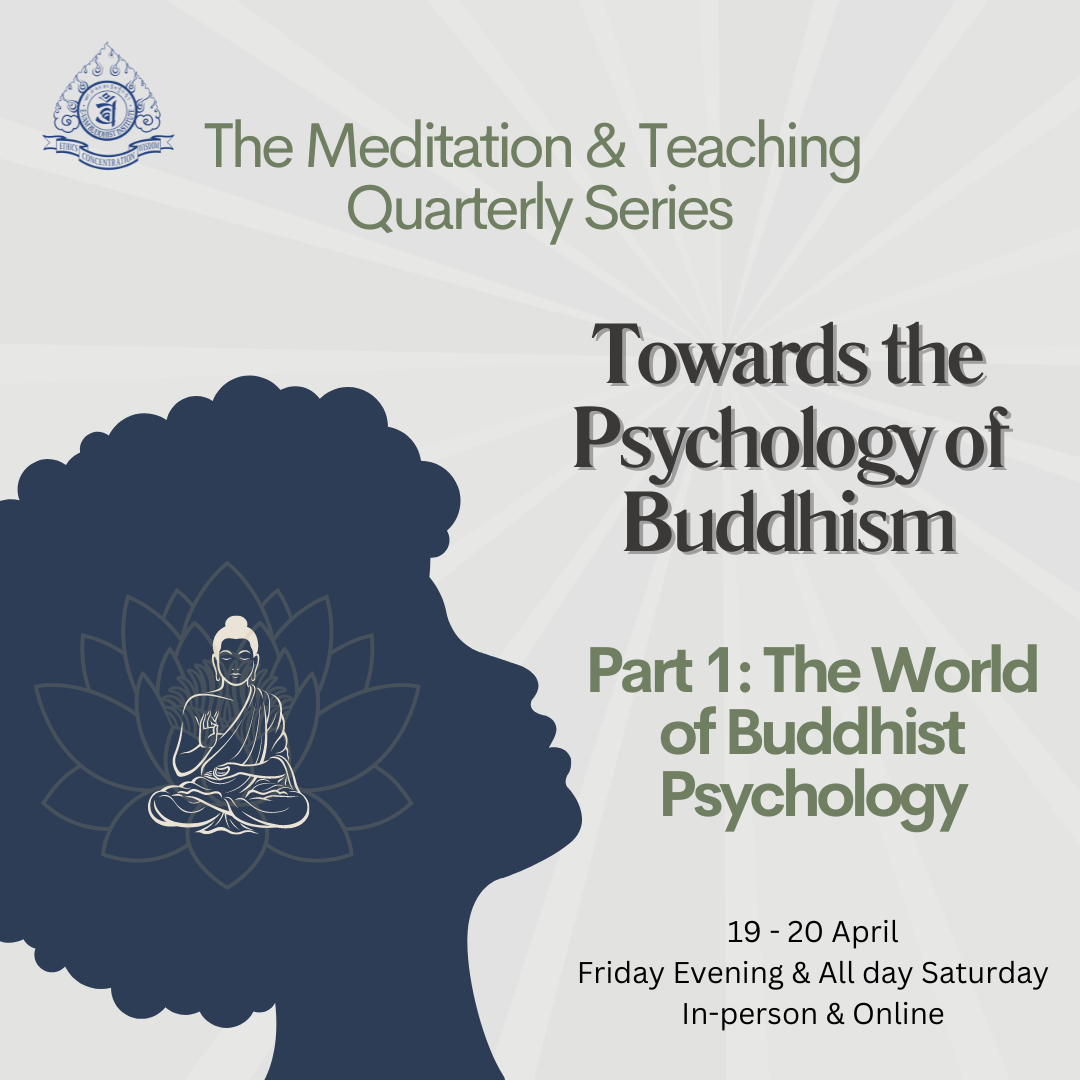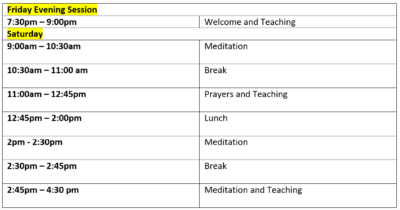
- This event has passed.
Towards The Psychology of Buddhism: The World Of Buddhist Psychology
April 19 @ 7:30 pm - April 20 @ 4:30 pm

Meditation And Teachings Series:
Towards The Psychology of Buddhism
Part 1: The World Of Buddhist Psychology
The Meditation Teachings Quarterly Series is an immersive opportunity to:
– Engage in the fundamental practice of Buddhist meditation
– while learning from the transformative insights of what Buddhism has to offer.
Over the course of this 4-part series, we will engage in extensive meditation practice while learning from the profound wisdom of Traleg Kyabgon Rinpoche’s recorded teachings. In this series, we will explore the unique Buddhist perspective of psychology.
This year is a fantastic opportunity to learn all about Buddhist Psychology!
Towards The Psychology of Buddhism
This year, the Meditation and Teaching Quarterly Series explores the topic “Towards The Psychology of Buddhism”. We will learn how to understand the mind, the self, and how to work with emotions, appreciating that this is our spiritual path.
Part 1 of 4: The World Of Buddhist Psychology
The evening of the 19th at 7:30pm & 20th April 9am – 4:30pm
In the first part of this series, Rinpoche invites us to consider the psychology of Buddhism from within its own terms, encouraging us to let go of our Western assumptions. Providing a developmental approach across the traditions of Buddhism from Early-Mahayana-Tantra-Mahamudra/Dzogchen and beyond, Rinpoche highlights the key aspects of Buddhist psychology with an emphasis on how to actually relate to our experiences within a dynamic and expansive perspective.
The first part of the series will begin on 19th April.
COURSE DESCRIPTION FOR PART 1
In Part 1, The World of Buddhist Psychology, explores :
- The early Buddhist approach that introduces the notion of “selflessness”, which was in contrast to the “essentialist” and “materialist” philosophies that dominated at the time.
- The relationship between selflessness, impermanence, and interdependence: The Buddhist notions that acknowledging that all things as changeable and interconnected.
- How our minds have a constant stream of thoughts and emotions arising and dissipating, and how those thoughts and emotions are dependant our previous experiences, thoughts and emotions.
- The two critical types of desire: a clinging, grasping type that keeps us in habitual cycles, and another that motivates us to be beneficial to ourselves and others.
- How our emotional reactions are related to our belief systems, and how we can educate ourselves to behave differently.
- The “Mahayana approach” that brought Buddhism out of the monastery and into the secular world, emphasising taking an interest in others and the harmonious balance of self and other. Also the cultivation of positive qualities, particularly the Mahayana notions of love and compassion.
- The six paramitas or transcendental actions of generosity, moral ethics, vigor, patience, meditation, and wisdom.
- The differences between the Mahayana approach and the Tantric approach.
- The Buddhist notion of negative tendencies and how tantric practices treat these negative aspects as fertile grounds for growth.
- The unification of body, speech, and mind through yogas, mudras, mantras, and active imagination/visualization.
- Visualization as a technique for exploring the space between conceptual and emotional experiences, and unifying opposites.
- Mahamudra, an approach that goes beyond the need to transform negative tendencies, introducing the notion of “being natural” and learning to “let it be”.
- How cultural conformity can influence the way we express our emotions.
- The Buddhist view on the importance of emotions and expressing them in a way that supports the intentions of love and compassion.
- How habits are reinforced by the ego, and how we can develop fearless confidence by facing our own emotions.
Often people say that Buddhists must come to a point where desire is completely annihilated
and therefore that there should be no desire whatsoever if a Buddhist wants to achieve enlightenment.
But when we start to look at it, even in relation to early Buddhism,
it has never been said that we should get rid of all desire and that there should be no desire whatsoever.
In fact it is a misunderstanding to think that desire is something that we have to get rid of.
This particular misunderstanding comes from getting two terms mixed up.
One is [Thana] which means ‘craving’;
the desire to really hold onto things,
to not let go,
or wanting to possess.
But the other kind of desire is called [Chanda]
which has to do with desire in terms of how we want to develop as a good human being
so we can conduct our life in such a way that it can benefit ourself and others.
It is never said that we should not have any desire of any kind.
What is being said is that our desire can be mishandled or misused
and therefore it can manifest in such a way that it will inhibit or incapacitate our growth.
We cannot grow if our desire is of a clinging nature
or if it manifests as attachment.
Traleg Kyabgon Rinpoche IX — The World of Buddhist Psychology
Part 2, 3 & 4 (on various dates throughout the year)
The subsequent parts of the series will emphasise “Meditation and Emotions” which formed some of the basis of Rinpoche’s book on “Desire: Why it matters”. Stay tuned for further course information for these parts.
SAVE THE DATES!
Want to commit to the whole series? Save the dates so that you won’t miss out on any parts of this Meditation & Teachings Quarterly Series!
Dates for the Meditation & Teachings Series:
Part 1 – 19-20 April
Part 2 – 14-15 June
Part 3 – 16 – 17 August
Part 4 – 7 December
Timetable

Event details for Part 1 of the series (You will have the option to buy tickets for the full event, or in sessions)
Session 1: Friday 19 April 7:30 pm – 9 pm
Session 2: Saturday 20 April 9 am – 12:45 pm
Session 3: Saturday 20 April 2 pm – 4:30 pm
Pricing for Part 1
Full event: $45
1 x session: $17
Discount applies! (see below for details)
*Commences on Friday evening and continues through Saturday. You can attend the sessions online or in-person
Pricing for the full Meditation & Teachings series (Part 1-4)
$150 (discounted price!)
** Full and associate members please note this course is a part of your membership benefits. Donations are more than welcome.
HCC Holder 10% (code: concession) | Members 100% (code: member) | Students 30% (code: student) | Under35 30% (code: under35) | * please show proof of concession at check-in
Dana Application: I wish to apply for Dana, financial support to attend this course at E-Vam. More information can be found at this link: (https://evaminstitute.org/dana/)
